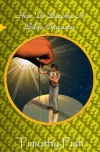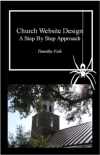
And Thy House
Extra Feature: High Res Image

History of
Cane Creek
Association
by D. F. Magruder
Attracting (and keeping) People
Written By: Timothy Fish Published: 8/27/2005
As webmasters we like to see the number of visits to our websites rise.† We secretly have dreams that our site will be as popular as those of Microsoft or Google.† We spend hours every month looking at the statistics for the site.† This partly to see what we can do to improve our results, but it is mainly just dreaming about what we would like to see happen.† Even so, the question still remains, why do some sites have so many visitors and some have so few?
There are two types of visitors, finders and seekers.† This is strictly from the point of view of the webmaster, because a web surfer quickly moves from one category to the other and back again.† A finder is a person who really just happens to stumble across the website.† It is very likely that you, the person reading this article, are a finder of this website.† A finder finds the website by using a search engine or by finding a link among some other related information.† A person might find this website while looking for information about website design.† When a finder visits a website, he gets the information he needs and then moves on.
Seekers are visitors that are not looking for a particular piece of information but have a desire to either use a feature of your website or to obtain information that your website provides.† The visitors to major search engines are usually seekers.† These people know that a website, such as Google, can help them to find the websites that contains the information they need.† Rather than searching for a search engine each time, these users go directly to the search engine through either typing the URL, through a bookmark through a toolbar or through something similar.
When considering the two, seekers are the most desirable because it gives us a chance to provide information about things that they had not considered looking for.† On several of the pages of the FortWorthBaptistChurch.org website I have placed lists of articles.† The one on the main page is especially important for seekers because it allows me to provide information related to our church to the people who have made the site their home page.† The calendar is also important to seekers because they can find out what is happening at church.
Even though we like having lots of
seekers, most of the people who visit our sites will not be seekers until they
have found the website as a finder.†
Our goal is to convert finders into seekers.† When this happens the increase in the
rate of visits is more sustainable, but converting a finder to a seeker is not
always easy.† Seekers are very picky
about the information that is provided.†
A finder may be looking for something as simple as the name of the fifth
President of the
To keep our website from looking abandoned we need to remove older information, even if we do not add new information.† The lack of new information does not hurt a website, but old information can kill a website.† But here we have a problem.† Seekers hate old information while finders donít care as long as it tells them what they need to know.† If we just remove the information then finders may visit our site but only see the 404 error page.† This is never a good thing.† If we leave the information we avoid the dreaded 404 error, but seekers are driven away by the old information.
What I have done to avoid this problem is to put expiration dates on articles that will lose their importance after a certain date.† When the expiration date is reached the article remains in the same location, but a message is displayed at the top that states that the information may be out of date and the pictures may have been removed.† This allows finders to look at the information and it lets seekers know that we are keeping the website up to date.† Even these expired articles are kept up to date because expiration statement will always be and up to date statement out the article.
Another thing that I do is keep the old events in the calendar.† A person who finds an even in a search engine will be able to look at the event, but person editing the calendar will not be able to change the information related to the event.† The event is hidden in the lists of future events, but it remains visible in the monthly calendar.
The key to attracting finders is providing relevant information.† The key to attracting seekers is to provide new information.† Both desire accurate information.† So if you want more visitors to your website keep adding accurate information without deleting but make sure that people are aware of how old the older information is.
Editor's Note: The author of this article has written a book titled Church Website Design.
www.timothyfish.com



